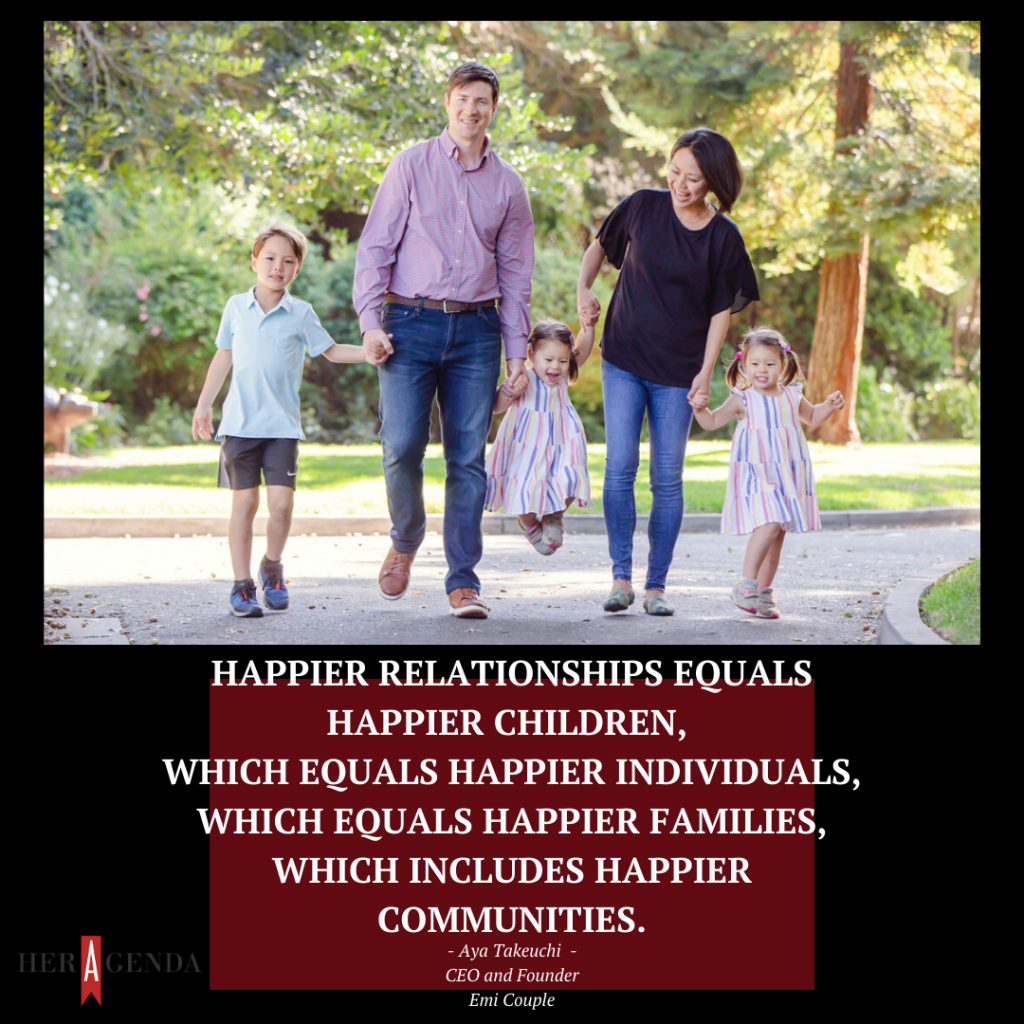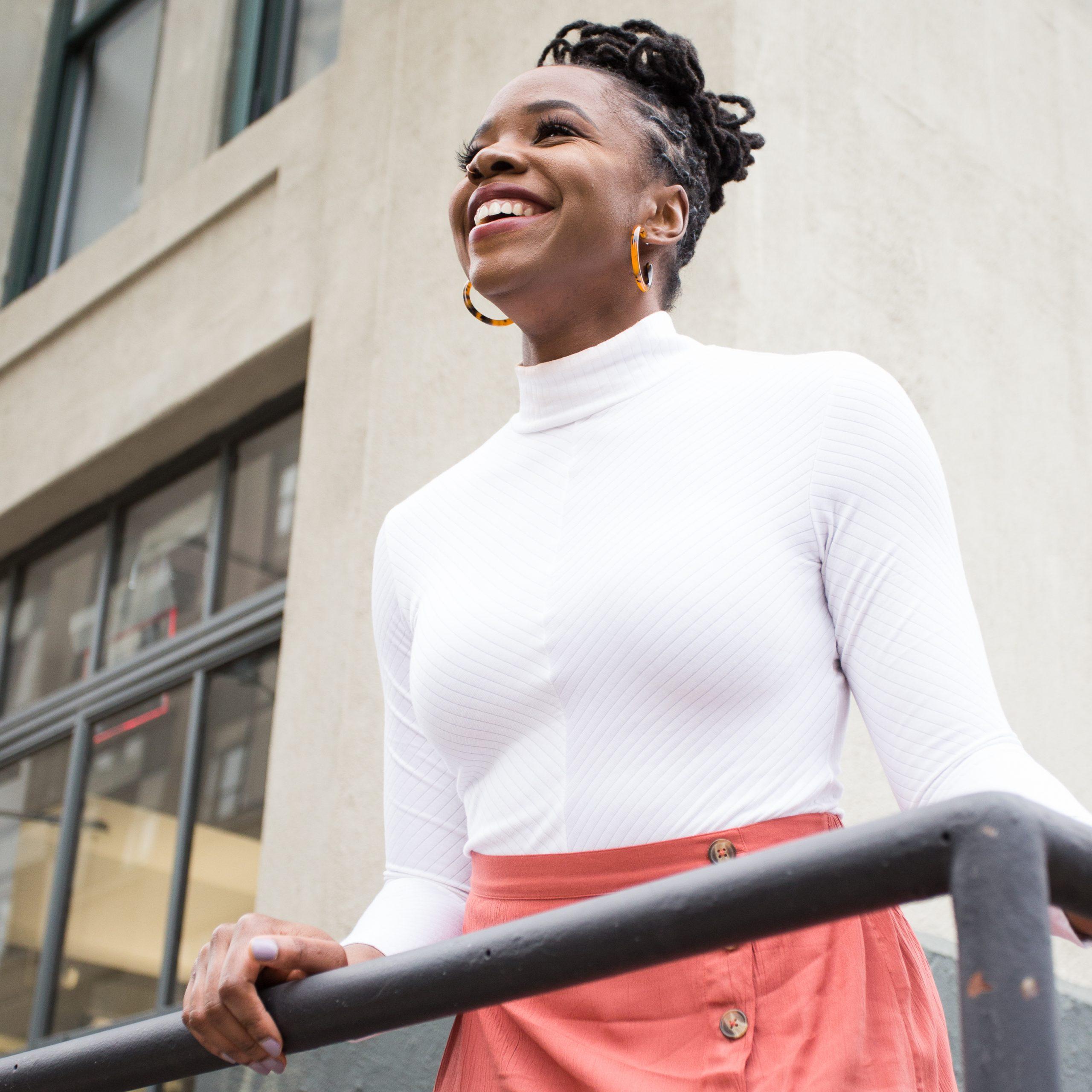How do you invest in your relationships? In the people you love and care about? Your partner? These are some questions that motivate the visions of Emi Couple, a relationship app that provides daily exercises for couples to center the wellness of their relationship. Co-Founded by Aya Takeuchi, this idea originated from the personal experiences Aya had when life got busy for her and her husband, and they wanted to find ways to keep their relationship a priority while balancing work and raising three children.
Aya’s own story spans global cultures, as her lessons on love and intimacy stem from the joy in sustaining relationships with those you care about the most. When Aya found that other couples were also desiring to (re)connect with their partner, she knew there was something to create. As Aya shares, all relationships, no matter what structure or identity, want love and happiness. Tested practices backed by psychology research prove that happiness does not just emerge, you have to work for it – daily, weekly, and in every moment.
This is what Emi offers to us all, a chance to acknowledge that we are all human, with different values, love languages, and hopes. If you mix those into the intimate relationships you hold, you are bound to have some challenges that emerge, but you do not need to succumb to them. Being in relationships takes work, and Emi’s app has a unique and innovative approach to make the work accessible for you.
We connected with Emi’s Co-founder, Aya Takeuchi, to learn more about the creation of this app, and her larger visions for bringing mindfulness, investment, and possibility into the heart of your relationships.
Her Agenda: What went into believing in this idea, and then bringing it to life? Getting others to believe in this idea? What made you decide to make this an app and text messaging platform?
Aya Takeuchi: We just felt like our relationship was on the backburner. I started talking to mom-friends first, scouring through Facebook groups, and I noticed a lot of posts with people feeling like their partners were becoming like roommates, or feeling a mental load because things weren’t being shared 50/50, or a difference in values. There was a lot of tension out there and I saw a need. Traditionally to solve these issues, people would read self-help books, but not everyone does. So, for research, I started reading self-help books. I found that people may not always follow-up on all that’s read in these books. Another traditional method was couple’s therapy, but it’s expensive and many may not have the time.
I also did a lot of research talking to relationship therapists. I found there were some great tidbits of information and advice that could be brought to the masses in a more casual and actionable way. We thought it would be great to digitize this content and give it to users every day. So, I started this first as a text service with some of my friends and received feedback from them. I then met my co-founder around that time, Hiroki Hori. He’s a technical guy, so we started scaling the text service, then developed an iOS app which we launched in December. The concept is: one, simple and short exercise you can do in a day.

Her Agenda: Before creating Emi, what was your professional journey? Where did you start, and what led you to this point?
Aya Takeuchi: I’m from Japan, as are both of my parents. I moved to the U.S. when I was 10 and stayed through college, attending Smith College where I was a psychology major. After college, because my family was in Tokyo, I went back and took a job in investment banking. I was in Japan for four years and really wanted to come back to the U.S., so I returned to pursue my MBA at Harvard where I met my husband. After graduating from Harvard, I got into tech.
I first started as a product manager at Amazon in 2006. Then I learned that Amazon wanted to launch their fashion category in Japan. Being 26, I knew this would be a great opportunity to move back to Japan and help this launch in the country I grew up in. So, I went back. This whole time I was still dating my, now, husband while he was working in the Bay Area. In order for us to be together, I came back to the U.S. and joined Walmart with the e-commerce group as a product manager where I worked on international launches in Japan and Canada. We got married during that time. With him being a Caucasian man from Canada, I felt it was really important for him to learn more about my culture and background. So, we decided to both quit our jobs and move back to Tokyo. We lived there for 3.5 years, where I worked for Mixi, a Japanese social network, leading their business side. We had our first child there and then decided to come back to the U.S. where I worked with Trusper (now Musely), a consumer lifestyle app where I also led the business side. Around then I started wondering about starting a business in an area that I felt passionate about. Then, I had my twin girls and life got busy. So, I started thinking about the needs in my life. My husband and I were both busy all the time, exhausted by 8pm, sitting on opposite ends of the couch. It was a good life, but we felt we could do a little bit more in our relationship. That’s where Emi started.

Her Agenda: What messages about love, romance, intimacy, marriage, and relationships did you receive growing up? How did they shape how you wanted to pursue relationships?
Aya Takeuchi: As a child, I moved around a lot. We lived in Portugal for five years, then the U.S., then back to Japan. Growing up with my parents and sister, the family unit was really important. My parents are traditionally Japanese and also nontraditional. Words of intimacy or romance went unsaid. How they showed love and care came through food.
The traditional side: my mom was a stay-at-home mom, and her way to show love was always having a lot of food ready and having the support system to make sure we did well in school and my dad was taken care of. The nontraditional side: they were always very physically affectionate with each other and us. Also, there was a big separation between adults and kids. This is different from how we raise our children now; kids are the center and parents are secondary.
-I noticed a lot of posts with people feeling like their partners were becoming like roommates, or feeling a mental load because things weren’t being shared 50/50, or a difference in values.
I also never really saw a difference in opinions or values between my parents. But, because I moved a lot as a child, I was able to see the diversity in relationships. So, growing up, I had to go back and forth between a homogenous society, and the nonhomogeneous society of the rest of the world. My mom also really emphasized this concept of a sustained relationship – she really wanted us to stay in touch with them. We would even write letters and holiday cards to my babysitter in Portugal years after. In hindsight, I think this is why I value intimacy and close relationships because, no matter where you are – together or apart – those are the things that are important to someone’s life.

Her Agenda: What is your vision for diversity and inclusion when it comes to supporting the health of relationships? Who does this include for you? What approaches are you taking to fulfill this vision to be a resource for diverse couples?
Aya Takeuchi: Diversity in relationships is everything. It’s gender, race, all formats (polygamous, monogamous, nonmarital partnerships). In some ways, this can make relationships harder because of the many different values that may show up if you raise a family. When my husband and I were dating, everything felt like it was on the same page. When you’re raising kids and getting to the details – education, sports, how you show love, differences in cleanliness, how you think about God, death – there are huge differences or styles that can show up when communicating with kids. All of these differences are not bad. It just means there are more opportunities to discuss and talk. Unless you have friends that are in the exact same situation as you, it’s hard to feel like it’s normal.
-When my husband and I were dating, everything felt like it was on the same page. When you’re raising kids and getting to the details – education, sports, how you show love, differences in cleanliness, how you think about God, death – there are huge differences or styles that can show up when communicating with kids.
Part of creating Emi is to explore all of these differences. With our content, we want people to feel like they’re not the only ones. We want everyone to understand that everyone’s goal is the same, everyone wants to be happy in a relationship. With Emi, no one’s enemy is here [in the relationship], and we want them to understand that shared goal.
Her Agenda: Can you share a bit more behind the approach to bringing psychology into this mission?
Aya Takeuchi: We aim to be research-backed and science-backed, and that’s deeply intertwined with romance. Romance isn’t just lovey-dovey, and we try to provide proven methods in an accessible way. That’s big. We have a couple’s psychology advisor that helps with all of the exercises. Psychologists actually do use these exercises. We’re all about creating good habits, and there’s a lot of psychology around how to make habits a routine.
We’re all about creating good habits, and there’s a lot of psychology around how to make habits a routine.
Her Agenda: What do you imagine being the greatest gift that can emerge for partnerships, communities, and the world through embracing this vision for mindful relationships?
Aya Takeuchi: Happier relationships equals happier children, which equals happier individuals, which equals happier families, which includes happier communities. So everything leads to the bigger community and world. The idea of family has changed over time – not being near family, or as close to our neighbors. We have to more increasingly rely on the village and the support because this family unit is so small, but we’re expecting so much of what ‘the village’ used to do, from our partners. We expect our partner to be everything – our lover, dad, mom, workmate – when in reality that’s not possible. So, at Emi, we want to eventually make the concept of intimate relationships bigger.
Maybe it’s your in-laws, close friend, the next-door neighbor. We want to eventually extend that concept beyond the immediate relationship and really bring happiness to communities and the world. It doesn’t hurt to take a minute to focus on those that really matter to you, not just your partner. The big mission, and potential, is to build a happier community and a happier world.

Her Agenda: What are some challenges you have faced as an entrepreneur building this and the successes you want to celebrate? What do you see as the future for Emi?
Aya Takeuchi: The awareness of this is still something new. When we started this a little over a year ago, society was still focused on self-care, but not as much about making relationships better. With COVID-19, there’s a little more tailwind in that area. The challenges are to let people know that it is okay to talk about your relationship. Everyone has their ups and downs. You need to put a little effort into your relationships. Also, building this inclusive and nonjudgmental community will be a challenge. Where we see success it is from users telling us how much this is helping their relationships and what joy the Emi texts bring. It’s becoming a habit for users, and we celebrate that. The overall vision is to make relationship wellness more mainstream.

Her Agenda: What is a message or reminder that you would like to share with couples right now? What piece of wisdom or advice would you want them to hold on to or be reminded of daily during these times?
Aya Takeuchi: The biggest thing is: we’re all in this together. We as a couple unit, and as the world. What you’re going through, your partner is going through as well. You might be expressing it in different ways, but you’re both in it. What’s going on right now doesn’t necessarily reflect the normal state of your relationship, or what your relationship will become. Don’t think you are doomed. Try to find the silver lining. Use this time to reflect and connect with each other and those that matter to you. There’s always a positive side, even in this uncertain period.
[Editor’s note: This interview has been edited for length and clarity.]









